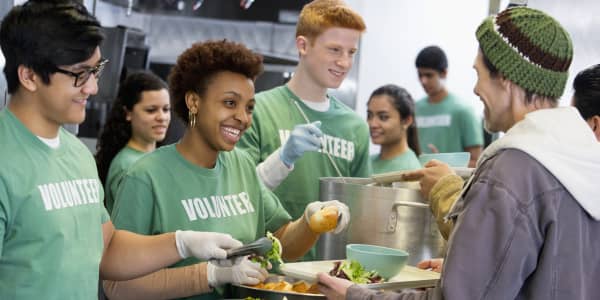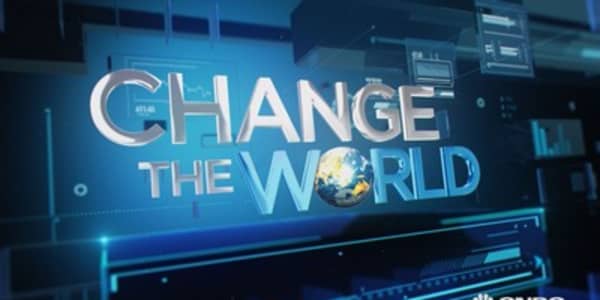Ebola has killed more than 5,000 people in three West African countries, but it has also orphaned thousands of children. This has aid organizations scrambling to care for them, in addition to fighting a disease that has fear and stigma attached to it.
Carolyn Miles, CEO and president of Save the Children, said her organization estimates there are more than 4,000 orphaned children in Sierra Leone, Guinea and Liberia—ground zero for the killer disease. Save the Children has so far raised $1.2 million in donations from the American public, with an estimated $800,000 in the pipeline from corporate partners. It also expects some $10 million in government funding from the U.S. and Britain, she said.
"Before this is over, I think it will be a $20 million to $25 million response," Miles told CNBC.
UNICEF, the United Nations' children's body, is also running a campaign to attract donors to fight Ebola. Its U.S. Fund advertises that it will match every dollar, thanks to a $3.6 million gift from the Paul G. Allen Family Foundation. It has so far raised $12.7 million but has already maxed out on the gift.
"The disease has grown exponentially, and needs have outgrown funding," said Caryl Stern, president and CEO of the U.S. Fund for UNICEF. She added that the Ebola outbreak has been designated a Level 3 emergency by the world body. "In my career, I have never seen five Level 3's at once."
In addition to Ebola, there is the Syrian refugee crisis and conflicts in Iraq, South Sudan and the Central African Republic, she told CNBC. "That means we are fighting the clock on Ebola."
Read MoreOne doctor's race to find a cure for Ebola
In addition to the usual aid, such as food, water, tents, medical equipment and supplies, Stern said UNICEF is training Ebola survivors to care for orphaned children during their 21-day isolation period. "That is empowering survivors who understand the fear and the pain. For a child, it can be a very scary time."
The world body is also sending mostly girls door-to-door in the poor West Point section of Monrovia, Liberia, to educate people about the disease.
Emergency aid
Disease knows no borders. The world needs to understand that Ebola is a global crisis.Caryl Sternpresident and CEO, U.S. Fund for UNICEF
Stern compared the outbreak to that of AIDS/HIV in the 1980s, when there was widespread fear and discrimination against people with the disease. "I hope we can learn from the mistakes of the past," she said. "Disease knows no borders. The world needs to understand that Ebola is a global crisis."
Gary Shaye, senior director for emergency operations at Save the Children, works with fundraisers to get the right equipment for a particular crisis. He said an estimated 2.5 million children under the age of five are at risk of Ebola in the region. But local efforts are limited, he said, pointing out that there are only 50 doctors in the public health system in Liberia, a country of 4 million to 5 million people. That is a ratio of 1 doctor to 100,000 people, compared with 240 doctors to 100,000 people in the United States.
Read MoreDrugmakers bet on Ebola vaccines, treatments
"Health systems are under tremendous strain. Diarrhea, malaria and pneumonia are the usual causes of death in children, and now there is Ebola, which may prevent children from getting regular vaccines," said Shaye, adding, "Donations are generous, but with the potential for Ebola to spread, this could be a multiyear response."
Save the Children has a budget of $675 million this year, CEO Miles said, but most of that has been assigned to existing operations, such as $50 million allocated for Syrian refugee efforts. Ebola operations, which include building treatment centers, trying to stop the spread of the disease and educating the population as well as caring for orphans, are funded from a general fund.
Miles just returned from Liberia but was not quarantined, as she did not visit any Ebola treatment centers. She said the fundraising effort in the United States had picked up noticeably since the disease appeared in Dallas in a man from Liberia who subsequently died.
Read MoreBy the numbers: Ebola in perspective
"Fundraising usually spikes when there is awareness," she said. "We have been working on Ebola (in West Africa) since March, but the media coverage increased in the summer. When it really spiked was when it first came to the U.S. Suddenly it becomes real!"
Miles said the fear and stigma attached to Ebola are almost as deadly as the disease itself.
"I met a family of four children, from 16 to 4, whose mom had died six weeks before, so they were beyond the incubation period. They not only have very little, but they are being shunned by the community. They (neighbors) burned everything in their home, and the kids are now sleeping on their porch," she said. "There is a stigma attached, and these kids are being told to sleep in the corner."
Miles added, "So one thing we are trying to do is provide survivor kits of food and water and helping them try to find extended family. And we are finding some families to take them in."
She said she also met with people who had survived the disease, which has a roughly 50 percent death rate. "They are immune, and we are trying to set up a system so survivors can help in the treatment centers."
Miles said fear of Ebola was apparent in Liberia even as education encouraged people to take precautions. "It has definitely sunk in—people wash their hands, there are no handshakes, and no one touches. Fear is palpable."
—By Steve James, special to CNBC.com




